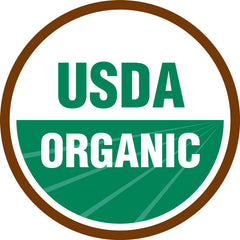USDA Certified Organic,
Food Grade Ethanol
Food Grade Ethanol
Culinary Solvent is pure, USDA Certified Organic 200 proof food grade ethanol. When most people say "organic alcohol", they mean food grade non-denatured ethanol products, like Culinary Solvent. Culinary Solvent products are independently certified as USDA organic by the Maine Organic Farmers and Gardeners Association.

Organic alcohol by CulinarySolvent.com, sometimes also referred to as organic non-denatured food grade ethanol, is ethyl alcohol produced with non-GMO, pesticide-free ingredients and sustainable methods, meets stringent organic standards and is free from synthetic additives, catering to health and environmentally conscious needs.
There are a number of benefits to choosing organic alcohol for your next tincture or perfume making project. If your final product will be Certified Organic, you may be required to source and use organic ingredients throughout your supply chain procurement process when available.

Organic alcohol is ethyl alcohol derived from certified organic ingredients, such as organic corn, sugarcane, or grapes, produced without synthetic chemicals, pesticides, or artificial fertilizers.
Organic alcohol follows strict USDA organic standards, ensuring it is made from clean, sustainably grown ingredients. Standard alcohol may not meet the same purity or environmental guidelines.
Organic alcohol is commonly used in tinctures, herbal extracts, food recipes, natural cleaning products, body care items, and DIY projects. Its purity and high proof make it suitable for diverse applications.
Yes, as long as it’s labeled food-grade or beverage-grade, organic alcohol is safe to consume. Always ensure you use alcohol specifically intended for edible purposes.
Choosing organic alcohol ensures a product free from harmful additives or chemicals, supports environmentally sustainable practices, and maintains high standards of quality and safety for your projects.
Organic alcohol is made from USDA-certified organic ingredients like corn, sugarcane, grapes, or wheat. These raw materials must be grown and processed in compliance with organic regulations.
Organic alcohol can cost more due to the rigorous certification process and sustainable farming practices, but its high quality, purity, and environmental benefits make it worth the investment.
Organic alcohol should be stored in a cool, dark space, away from sunlight and heat sources. Use a tightly sealed container to prevent evaporation and maintain its purity.
Not all organic alcohol is undenatured. Check the label for terms like “non-denatured” or “undenatured” to confirm it’s additive-free and safe for edible applications or tincture-making.
Yes, organic alcohol is an excellent choice for herbal tinctures. Its purity and high proof make it an ideal solvent for extracting beneficial plant compounds.
Yes. organic alcohol bottled at 200 proof is excellent for perfumery recipes and projects.
Yes. You can substitute 200 proof organic grain alcohol 1-for-1 in any recipe or project that calls for denatured alcohol.
Yes. Both terms "undenatured" and "nondenatured" mean zero additives and are used interchangeably to represent pure alcohol products. Culinary Solvent 200 proof food grade alcohol contains zero additives and is considered a non denatured alcohol product.
Look for the USDA organic seal on the label. To ensure authenticity, ask the supplier for a Certificate of Analysis (COA) or proof of certification.
The corn used to make our Organic Culinary Solvent is non-GMO. The corn used to make our non-organic Culinary Solvent is not guaranteed to be non-GMO and therefore not labeled as such.
Culinary Solvent is certified organic by the Maine Organic Farmers and Gardeners Association (MOFGA).